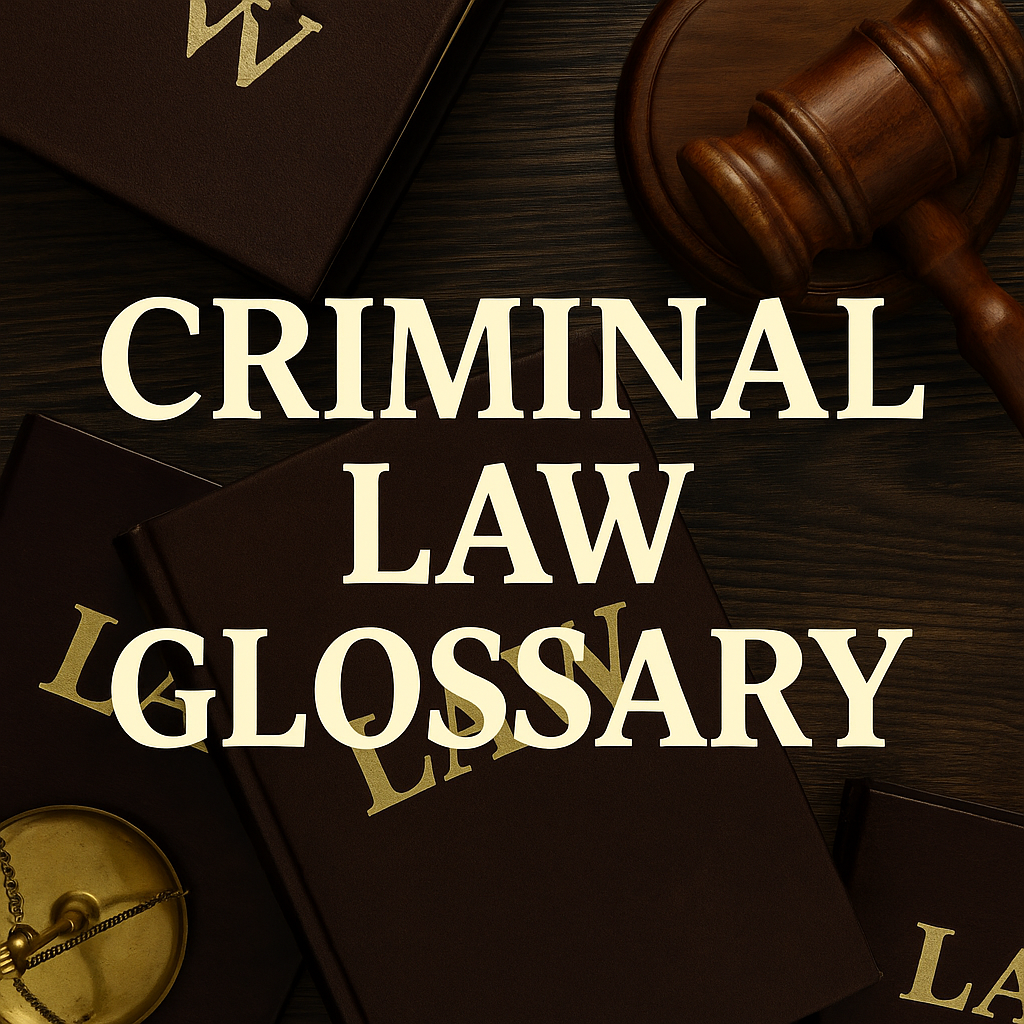
Criminal Law Glossary
- Accessory: A person who assists in the commission of a crime but is not present at the crime scene.
- Accessory After the Fact: A person who knowingly assists someone after they have committed a crime to evade arrest or punishment.
- Accomplice: A person who actively participates in the commission of a crime.
- Actus Reus: The physical act of committing a crime, distinct from the mental intent (mens rea).
- Admissible Evidence: Evidence deemed valid and acceptable in a court of law.
- Affidavit: A written statement of facts, sworn under oath, used as evidence in court.
- Aggravated Offense: A crime made more serious due to circumstances like the use of a weapon or intent to cause harm.https://dictionary.law.com/Default.aspx?selected=406
- Alibi: Evidence showing the defendant was elsewhere when the crime occurred.
- Arraignment: The initial court hearing where the defendant is formally charged and enters a plea.
- Attempt: An incomplete criminal act where the intent to commit the crime exists but the act is not completed.
- Bail: Money or property given to the court to secure the temporary release of a defendant, ensuring their appearance at future court proceedings.
- Bail Bondsman: A person or agency that provides bail for a defendant in exchange for a fee.
- Battered Woman Syndrome: A psychological condition that may be used as a defense for someone who has committed a crime under the influence of prolonged abuse.
- Beyond a Reasonable Doubt: The standard of proof required in a criminal case for a jury to convict the defendant.
- Burden of Proof: The obligation of the prosecution to prove the defendant’s guilt.
- Capital Offense: A crime punishable by the death penalty.
- Charge: A formal accusation of a crime made by a prosecuting authority.
- Circumstantial Evidence: Evidence that indirectly proves a fact, requiring inference.
- Civil Asset Forfeiture: A process where law enforcement seizes property suspected of being connected to criminal activity, even if no charges are filed.
- Concurrent Sentences: Multiple sentences served at the same time.
- Consecutive Sentences: Multiple sentences served one after another.
- Controlled Substance: Drugs or chemicals regulated under federal or state laws due to their potential for abuse.
- Conviction: A formal declaration that the defendant is guilty of a crime, typically after a trial.
- Criminal Intent (Mens Rea): The mental state of knowingly or purposefully committing a crime.
- Cross-Examination: The questioning of a witness by the opposing party during a trial or hearing.
- Defendant: A person accused of a crime in a criminal case.DUI vs. DWI: What’s the Difference?
- Deferred Sentence: A sentence postponed to allow the defendant to meet certain conditions before final judgment.
- Double Jeopardy: The constitutional protection against being tried twice for the same crime.
- Duress: A defense claiming the defendant was forced to commit a crime due to threats of harm.
- Due Process: The legal requirement that the government respects all legal rights owed to a person.
- Entrapment: A defense claiming the defendant was induced by law enforcement to commit a crime they otherwise would not have committed.
- Exculpatory Evidence: Evidence that can clear a defendant of guilt.
- Exoneration: The legal clearing of a person from blame or guilt.
- Expungement: The legal process of erasing a criminal conviction or arrest record from public records.
- Felony: A serious crime punishable by more than one year in prison.
- Felony Murder Rule: A legal doctrine holding someone liable for murder if a death occurs during the commission of a felony.
- First-Degree Murder: A premeditated killing with intent to cause death or serious harm.
- Forensic Evidence: Scientific evidence, such as DNA or fingerprints, used in criminal investigations and trials.
- Good Faith Exception: A doctrine allowing evidence collected under an invalid warrant to be admissible if law enforcement acted in good faith.
- Grand Jury: A group of citizens tasked with determining whether there is enough evidence to charge someone with a crime.
- Habeas Corpus: A legal action challenging the legality of a person’s detention or imprisonment.
- Hearsay: Testimony in court about a statement made outside of court, generally inadmissible unless an exception applies.Personal Injury Matters – Legal Glossary
- Indictment: A formal charge issued by a grand jury accusing someone of a crime.
- Indigent Defense: Legal representation provided to defendants who cannot afford to hire an attorney.
- Involuntary Manslaughter: A killing resulting from recklessness or criminal negligence.
- Jury Nullification: When a jury refuses to convict a defendant despite evidence of guilt because they disagree with the law or its application.
- Mandatory Minimum Sentence: A legislated minimum sentence that must be imposed for certain crimes, regardless of mitigating factors.
- Miranda Rights: The rights read to an individual upon arrest, including the right to remain silent and the right to an attorney.
- Misdemeanor: A less serious crime punishable by less than one year in jail or fines.
- Money Laundering: The process of concealing the origins of illegally obtained money by passing it through legitimate channels.
- No Contest (Nolo Contendere): A plea where the defendant does not admit guilt but accepts punishment.
- No-Knock Warrant: A warrant allowing law enforcement to enter a property without prior notification to the occupants.
- Parole: The conditional release of a prisoner before completing their sentence, under supervision.
- Plea Bargain: An agreement in which the defendant pleads guilty to a lesser charge to avoid a trial or receive a lighter sentence.
- Preliminary Hearing: A hearing to determine if there is enough evidence to proceed to trial.
- Probation: A court-imposed sentence that allows the offender to remain in the community under supervision instead of serving jail time.
- Pro Bono: Legal work performed voluntarily and without payment, often to assist low-income clients.
- Prosecution: The legal party responsible for presenting the case against the defendant.
- Protective Order: A court order designed to protect a person from harassment, abuse, or stalking.
- Racketeering: Engaging in illegal business activities, often under organized crime, covered by RICO laws.
- Reasonable Suspicion: A standard of proof in criminal law, less than probable cause, that justifies an officer’s investigative stop.
- Recidivism: The tendency of a convicted criminal to reoffend after serving their sentence.
- Restitution: A court order requiring a convicted person to compensate the victim for their losses.
- Restorative Justice: A process focusing on repairing harm caused by criminal behavior, often involving dialogue between victims and offenders.
- Search and Seizure: A legal process where law enforcement examines and takes property as evidence, governed by the Fourth Amendment.
- Search Warrant: A legal document authorizing law enforcement to search a person, place, or vehicle for evidence of a crime.
- Second-Degree Murder: A killing that is intentional but not premeditated.
- Self-Incrimination: The act of implicating oneself in a crime, protected against by the Fifth Amendment.
- Sequestration: The isolation of a jury during a trial to prevent exposure to outside influence or media.
- Speedy Trial: The constitutional right ensuring a defendant is tried without unreasonable delay.
- Statute of Limitations: A law prescribing the time limit within which legal action must be taken for a crime.
- Statutory Rape: Sexual activity with a person below the age of consent, regardless of consent provided.
- Subpoena: A legal document ordering someone to appear in court or provide evidence.
- Testimony: A formal statement made by a witness under oath during a trial or hearing.
- Three Strikes Law: Legislation imposing severe penalties, including life sentences, on repeat offenders after three convictions.
- Venire: A pool of potential jurors summoned for jury duty.
- Verdict: The final decision made by a jury or judge about the guilt or innocence of a defendant.
- Victim Impact Statement: A written or oral statement made by the victim or their family during sentencing to explain the crime’s impact.
- Voir Dire: The process of questioning potential jurors to determine their suitability for serving on a jury.
- Warrant: A legal document authorizing law enforcement to perform a specific action, such as an arrest or search.
- Weapons Enhancement: Additional sentencing for crimes involving the use of a weapon.
- White-Collar Crime: Non-violent crimes committed for financial gain, such as fraud or embezzlement.
- Witness: A person who provides evidence in a trial based on their knowledge or observations.
- Wrongful Conviction: A conviction of a person for a crime they did not commit.

